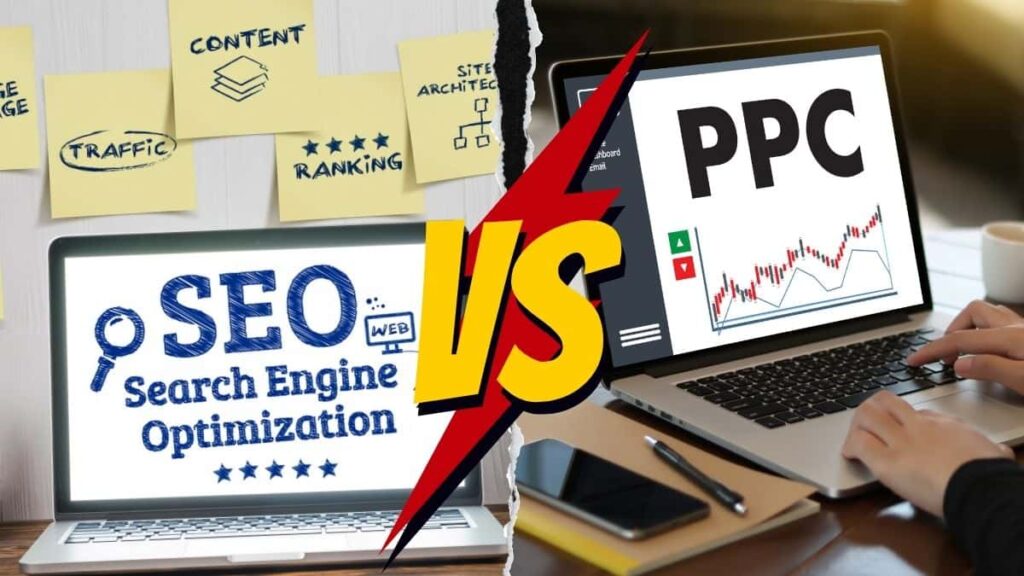Explore the relationship between SEO vs. PPC for a balanced digital marketing approach with this tutorial. Which is better for business: SEO or PPC? Which one should you pour your efforts into?
Table of Contents
Truth be told, the answer isn’t one or the other. You need them both to succeed!
While both channels focus on boosting traffic and sales, there are basic differences between the two. If you’re not sure where to start, then Proadept Academy, the best SEO training institute in Kolkata, will walk you through this article about the contrasts between SEO vs. PPC, the advantages and downsides of each, and how to use both channels together as part of a smart digital marketing campaign.
Learn an advanced SEO course from scratch at just Rs.6,999/-. Enroll now.
SEO vs. PPC: What’s the difference?
Before delving into the advantages and downsides of SEO and PPC, it’s necessary to identify the two.
Defining SEO
SEO, or search engine optimization, helps your website rank in non-paid search listings. Typically, the higher rankings you achieve, the more visits you gain to your website.
Organic search results used to be referred to as the “10 blue links.” However, the search engine results page (SERP) has become increasingly sophisticated.
Organic results can be comprised of any or a combination of the following:
• Organic listings.
• Maps
• Knowledge Panels or Graphs.
• Featured Snippet
• Images
•Videos
• People Also Ask box.
Here’s a modern-day example of an organic listing. Notice that the top listing has an initial publishing date of 2014!
Defining PPC, or pay-per-click, focuses on targeting consumers with a combination of keywords and audience targeting to display PPC ads on the search results page.
Like organic results, formerly, sponsored search ads were made up of headline and description text.
Today, PPC ads on the SERP can expose much more than plain ad copy. Other characteristics that may be featured in a search ad include:
• Sitelinks.
• Images.
• Star ratings.
• Business profile location.
• Phone number.
• And more.
Here’s an example of a current paid search ad listing:

Comparing SEO vs.PPC
A typical search results page has a combination of both paid advertising (PPC) and organic (SEO) listings.
What’s the difference between SEO and PPC?
SEO PPC
Indirect costs Direct cost per click
Traffic potential is ongoing and infinite. Traffic potential is limited by budget.
It takes time to observe outcomes. Almost immediate results
Often perceived as more credible Can be perceived as less credible.
It can be harder to compete in some industries. Can compete directly with larger competitors.
SEO Pros and Cons
Investing in SEO has various commercial advantages but also has its downfalls.
Let’s take a look at some of the pros and cons of SEO.
• SEO can cost less in the long term. Technically, SEO traffic is “free” because you’re not paying the search engines for each click, unlike PPC. SEO initiatives do require indirect costs, such as paying an SEO consultant or agency, optimization tools, and more. By investing in quality resources, the “cost” will pay off greatly in the long run.
• SEO can deliver sustained, regular traffic over time. Early efforts into SEO can help attract people to your website, even if PPC resources are constrained—or even cut. Over time, having a well-optimized SEO approach might help lower the dependency on sponsored search and increase marketing efficiency.
• SEO may increase your brand’s credibility and trustworthiness. Sometimes, advertising has a negative reputation, and people are more likely to trust organic results. The higher you rank, the more you’re perceived as an authoritative source by your target audience.
Even though you can achieve big revenues with good SEO, it doesn’t come without its pitfalls.
• It requires patience to see results. • It’s very competitive. • Ongoing effort to maintain results is important. • Search engine algorithm adjustments can affect website exposure.
• Quality content can be challenging, especially for small businesses. • Organic visibility can be impacted by ad dominance on the SERP.
Defining crucial goals and monitoring procedures from the outset makes it easy to identify if your SEO efforts are paying off or if pivots are necessary.
PPC Pros and Cons
Before deciding to invest in PPC, make sure to assess the advantages and cons.
Here are some of the key pros of PPC:
• PPC is highly targeted and aims to create a massive impression by reaching the correct audience. There’s a plethora of strategies to target ads, including keyword, demographic, lifestyle, contextual, location, and more. Narrowing your reach helps ensure your PPC expenditure is getting the most relevant traffic to your website—and, ultimately, better consumers.
• PPC can show immediate results. Setting up your first PPC campaign can take as little as a few hours. Unlike organic traffic, which takes time to prove its usefulness, PPC advertising can start delivering nearly immediately following a campaign launch. PPC is a superb approach to increasing website traffic and sales in a short period.
• PPC is easy to test and experiment with. Not only can PPC demonstrate results swiftly, but it’s also faster to expand and optimize. A/B testing may be performed at scale and commonly within the advertisement platform, like Google advertisements. The sooner data is gathered, the faster it can be evaluated, tested, and altered for better results.
Like all other channels, PPC has its downfalls.
• It might become incredibly pricey.
Why are ads sometimes perceived as less convincing?
• Traffic stops as soon as the budget is gone.
• Ad efficiency can fall.
• Keyword targeting has loosened in recent years.
You should have a better awareness of the advantages and disadvantages of SEO vs. PPC. Now it’s time to answer the burning question: SEO or PPC? Should I use SEO or PPC? This topic is strongly debated, with lots of diverse opinions. The fast answer? It depends.
In a perfect scenario, both SEO and PPC operations are routinely focused. But we live in an imperfect world, and sometimes choices need to be made. If you must decide between one or the other, there are specific instances when adopting one channel makes more sense.
#1: You Have a Limited Budget
If you’re stuck with a limited budget or perhaps no marketing budget, SEO can be a more cost-effective technique in the long term. Focusing on developing wonderful content to build brand awareness through SEO best practices will help boost long-term traffic to your website.
It’s the up-front, indirect costs associated with locating the correct person, firm, and/or tools that are needed for SEO to pay off down the line.
#2: You Have a Niche Product
To get organic traffic, your site needs to rank for topics or keywords that users are currently searching for. Remember: search doesn’t create demand; rather, it catches demand. If your product or service is in a specialized field, gaining organic traffic could be difficult or take longer.
In this case, investing in PPC can help generate speedy brand awareness and give your site a much-needed shove in traffic

#3: You’re Preparing for a Product Launch or Sale
Like in the prior scenario, you may be releasing a brand-new product in the marketplace—something that’s never been launched before. If people don’t know what it is, they won’t know what or how to look for it! Or maybe you’re launching a major sale on your website that has an end date.
Utilizing PPC around a large product launch or promoting a bargain is your best bet in this instance. When advertising sales, not only may investing in PPC create more visitors, but you can also utilize ad copy or promotion materials in search or shopping ads.
#4: You Have a Local, Brick-and-Mortar Business
If you’re a local business, investing in local SEO is important for long-term success. A sound local SEO campaign can help your business appear in local search results, which is crucial for obtaining nearby clients.
Ensuring your website or Google Business Profile (GBP) ranks well organically helps decrease the demand for local PPC ads.
#5: You Have A Highly Competitive Product
This position is tough and can be an either/or circumstance. If you have a highly competitive product, organic ranking will take a lot of time, work, testing, and patience.
But does that mean you shouldn’t execute SEO in this scenario? Not! Investing in SEO in a competitive industry is still well worth the effort. However, PPC allows you to compete directly with larger firms with competitive keywords. But keep in mind that competitive keywords come with a price tag.
If you have the budget to invest in competitive keywords, PPC can help improve traffic and sales in the short term while you still work on your long-term SEO approach.
Using SEO and PPC together
Perhaps a better answer to the widely discussed question of SEO vs. PPC? You should be utilizing both. It’s a prevalent misperception that SEO and PPC compete against one another. Successful brands employ both SEO and PPC because they enhance one another, not compete!
Let’s look at some techniques to employ SEO and PPC together.
#1: Link Search Console to Google Ads for Data Sharing
There’s a lot to be learned from integrating Search Console with Google Ads. With the paid and organic reports in Google Ads, you’ll uncover data insights that benefit both PPC and SEO operations.
For example, you’ll discover how often pages from your website appear organically and what search terms generated those results. Looking at the paid and organic reports helps you better understand how PPC advertisements and organic results work together and where to focus and prioritize efforts.
If organic rankings are struggling for highly competitive keywords, PPC ads can help boost visibility for those phrases. If your site is doing well for lower-volume, specialist keywords, then those may not need to be prioritized in your PPC program.
#2: Promote organic content via PPC ads
If you’re spending hours developing website material but nobody sees it, it could be seen as wasted labor. Boosting information such as blog articles, videos, or whitepapers via PPC ads might reach your target audience more rapidly. That quality material can rank highly in the long term, but it will take time. Use PPC or paid social media advertisements to make that material visible!
#3: Use PPC for A/B Test Copy and Landing Pages
One of the main benefits of PPC is faster learning and testing. But these learnings don’t just apply to PPC ads. They should be executed comprehensively! If you’re testing ad language or a landing page design that creates a clear winner, those winners should be put out on your website.
This is another obvious evidence of how PPC expenditure pays off, not merely instantly evident in visitors and sales from those advertisements. In summary, instead of thinking about SEO vs. PPC, start considering SEO alongside PPC. The two may, and should, work together to improve your internet presence and generate sales and leads.
There can be occasions when SEO should be addressed before PPC, and vice versa.
In every circumstance, what’s perfect for your brand will depend on various criteria, including the ones outlined above. By having SEO vs. PPC top of mind, you’ll come up with a superb holistic digital marketing plan that has the two functioning together.
Join our Advanced SEO training course in Kolkata to maximize your opportunities to land a dream SEO job or project. Contact us now



